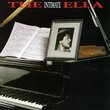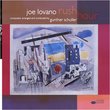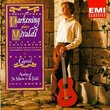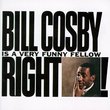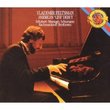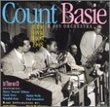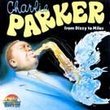| All Artists: Bela Bartok, Fritz Reiner Title: Bartók: Concerto for Orchestra; etc. [Hybrid SACD] Members Wishing: 2 Total Copies: 0 Label: Octjay Release Date: 9/14/2004 Genre: Classical Styles: Forms & Genres, Concertos, Historical Periods, Classical (c.1770-1830), Modern, 20th, & 21st Century, Symphonies Number of Discs: 1 SwapaCD Credits: 1 UPC: 828766139020 |
Search - Bela Bartok, Fritz Reiner :: Bartók: Concerto for Orchestra; etc. [Hybrid SACD]
![Bartók: Concerto for Orchestra; etc. [Hybrid SACD]](https://nationalbookswap.com/cd//l/10/0410/6120410.jpg) | Bela Bartok, Fritz Reiner Bartók: Concerto for Orchestra; etc. [Hybrid SACD] Genre: Classical
|
Larger Image |
CD DetailsSimilarly Requested CDs
|
CD ReviewsThe Gold Standard for these Bartók works. Bob Zeidler | Charlton, MA United States | 12/29/2004 (5 out of 5 stars) "I suppose I could well have waited a few more days, until the turn of the New Year, to be able to say "Now, 50 years later, Bartók's Concerto for Orchestra as it must have sounded to the engineers in the studio." After all, this "classic of all classics" does date from 1955. (The other two works on the album have recording dates from 1958, and I sure don't plan to wait *that* long for a silver anniversary!) Actually, I have been listening to this hybrid SACD release for at least a few weeks now, but it was only this past weekend that I had my first opportunity to listen directly to the SACD layer; previous hearings were of the "redbook" CD layer only. So, I'm jumping the gun as regards the 50 year celebration, but for good reason. The newly-mastered DSD sound from the analog master tapes, as heard in the SACD layer, are enough of an improvement over the redbook CD sound to justify my impatience. And the redbook CD layer is already excellent as it is! At this late date, there is little left to be said about how significant these performances are. By now, anyone interested in these Bartók works probably already knows that Fritz Reiner had two things in his favor in these performances that make them as authoritative as they are: His close personal friendship with the composer, and the Chicago Symphony Orchestra in one of its most glorious periods, almost without equal (thanks of course to Reiner). Not always apparent (particularly in some of the many earlier releases of this work in less than excellent sound in years past) was the contribution of the RCA engineers in those very early days of stereo. But it all comes together, in sound better than ever thought possible, thanks to DSD (Direct Stream Digital) processing of the original analog master tapes and SACD technology for converting the sound back to analog, giving us the nearest thing to "perfect analog"; the closest possible replica of the original tapes. The Concerto for Orchestra is, by far, Bartók's best-known and most popular work, immediately accessible in a way that many of his other mature works are not. (His very earliest works, such as "Kossuth" and the "Orchestral Suite No. 1," written largely in the style of Richard Strauss before he began his studies of Hungarian and Rumanian folk music, are also immediately accessible, if hardly of the quality of his mature works.) Reiner, being as close to Bartók as he was, knew this work "inside and out" and committed a performance for the ages in this session. He of course was also aware of the reason why Bartók chose to parodize the "invasion" theme from Shostakovich's 7th Symphony in the fourth movement of the Concerto, and plays this loopy parody, complete with its growling trombone raspberries, for all it is worth. But the work is of course much more than this oft-mentioned parody, and Reiner's interpretation is as good as any, and now - with DSD/SACD technology - fully competitive to versions recorded decades later. If the Concerto for Orchestra is Bartók's most popular and accessible work, then Music for Strings, Percussion and Celeste ("MfSPC") is probably his greatest masterpiece in respect to incorporating his studies and usage of Magyar folk music into "serious" works. Here, Reiner and his Chicagoans are, if anything, even better than in the Concerto. Their execution of the work has a hair-raising "snap" that many other performances fail to achieve, and the sound - three years newer (1958) than the session at which the Concerto had been recorded - is even better. The final work on the album is his Hungarian Sketches, again exhibiting the results of his musicological studies as incorporated into a unique personal style. It - like the MfSPC - was recorded in 1958 sessions, but, like that work, sounds as if it had been recorded just yesterday. For those coming upon this work for the first time, don't expect to hear ersatz "ethnic" music in the vein of Liszt and, say, Enescu. Not that assimilating the five movements is in any way difficult, but it is really only in the final movement ("Swineherd's Dance") where the music approximates what we generally tend to think of as "Hungarian folk music." But clearly tinged with the unique piquancy that was Bartók. This is an album that always had been famous for its performances. Now, fifty years after the fact, thanks to DSD/SACD technology, it can also be appreciated for having the sound quality that had been there all the time on the original master tapes, but never quite realized with this level of perfection in its earlier reincarnations. An essential album if ever there were one! Bob Zeidler" There and then, here and now Rick Darby | 06/17/2005 (5 out of 5 stars) "Many years ago I knew someone who had often heard Fritz Reiner conduct the Chicago Symphony Orchestra in concerts (a pleasure I am sorry to say I never experienced). Reiner's conducting style, he said, was at the opposite extreme from the histrionics of (for instance) Leonard Bernstein. On the podium, Reiner exhibited no baton waving, choreographic body language, or ecstatic or pained facial expressions. In fact, said my acquaintance, if you were seated directly behind Reiner you might not see him move at all for long stretches! Such was his rapport with the orchestra that no show-biz gestures were necessary, not to mention foreign to his temperament. The performances he led of the two major works on this disc suggest what he was able to achieve when he conducted music that suited him. (His recordings of Richard Strauss are in the same category.) Reiner surely had an affinity with Bartok (partly, perhaps, because Reiner too was originally Hungarian). There are recordings that make you think, "What a superb orchestra!" There are others that elicit accolades for the interpretation or the sound quality. And then there are a very few -- the best -- that make you forget about things like those while you're listening, and if you have any thought it's simply, "What great music this is." Reiner's Bartok falls into that rarefied category, and I can think of no higher praise. The Concerto is probably the most popular and most frequently performed 20th century piece of orchestral music. Like anything that is played and recorded often, it can seem to be too much of a good thing. To Reiner and his Chicagoans of the 1950s, it was relatively new music, and the fact that it had not yet become standard repertory may have been one reason they were able to project it so vividly: there was no routine to fall into. It would be absurd to say that listening to this recording was like hearing the Concerto and the Music for Strings, Percussion, and Celesta for the first time. Nevertheless, I was more conscious than ever of the strangeness mixed with the beauty, the exoticism coupled with the power. Technically, the recording is not one marvel but two. First was the original recording team from RCA, who must have been geniuses. Not only did they record these performances in two channels (the Concerto) and three channels (the Music for Strings etc.) before there was any commercially established way of reproducing multiple channels in playback, but they also must have used what was then state-of-the-art mikes and tape recorders. The second marvel is the SACD remastering, which was clearly done by sound engineers who knew their business and who used only the original channels, not adding synthetic rear channels. The result is that 50 years drop away, and you are there and then. Or, thanks to the realization of Bartok's scores that you are hearing, in some wondrous dreamscape beyond place and time. What great music this is." A Peerless Recording A user. | Toronto, Canada | 04/30/2006 (5 out of 5 stars) "I loved the previous issue of this recording, but this one is even clearer, which is some praise, since the previous issue was a brilliant pressing of a brilliant recording. I never tire of Reiner's performance.
There is no other recording of these pieces that approaches this one - absolutely none (not even Leinsdorf's version). Not only is this Reiner disc the best Bartok recording ever made, but it is one of the best classical recordings ever made... truly a desert island disc. Only a cretin wouldn't buy this record. ;)" |

 Track Listings (14) - Disc #1
Track Listings (14) - Disc #1